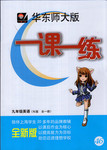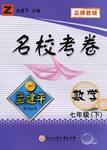


 华东师大版一课一练系列答案
华东师大版一课一练系列答案 孟建平名校考卷系列答案
孟建平名校考卷系列答案科目:高中英语 来源:辽宁省辽中县第一私立高级中学2009-2010学年高一下学期期末考试(英语) 题型:阅读理解
The UN passed a rule in the year 2004 to improve the quality of drink water and reduce deaths caused by drinking unhealthy water each year. The UN has already worked out the specific plan to reduce half of the number, that is, five thousand. The UN announced in the world there are about 1/6 of the world population can't meet the sanitation regulation of drinking water.
The water we drink and use is running short in the world. We all have to learn to stop wasting our quite limited water. One of the steps we should take is to find ways of reusing it. Experiments have already been done on this field. Today in most large cities, fresh water is used only once, then it runs into waste system. But it is possible to pipe the used water to a purifying(净化)factory. There it can be filtered(过滤) and treated with chemicals so that it can be used again , just as it were fresh from a spring. But even large cities purified and reused its water, we still would not have enough. Then we could turn to the oceans. All we would have to do to make use of seawater on earth is to get the salt out of it. This method has already been used in many parts of the world.
47. The way to stop wasting water is to ________ .
A. do experiments with water
B. purify the used water and reuse it
C. use fresh water once again
D. make use of seawater
48. The passage tells us how to reuse the used water. Which is the right order of the process?
a. to have the used water filtered b. to put chemical in it
c. to pipe it to the user
d. to pipe the used water to be purified in a factory.
A. dabc B. bcda C. bdca D. dcba
49. There wouldn't be enough water for us if we didn't ________ .
A. turn to the ocean for more water
B. reuse used water and make use of seawater
C. make fresh water from the seawater
D. take steps to reuse all water on earth
50. The word "it" underlined in the last paragraph refers to ________ .
A. the process of collecting salt from the ocean
B. the process of getting rid of the salt in seawater
C. purified water
D. seawater
查看答案和解析>>
科目:高中英语 来源:2011届重庆市高三第一次调研测试英语试卷 题型:阅读理解
I have to admit: I don’t flush(冲) the toilet every time I go to the bathroom. In fact, I firmly believe “If it’s yellow, let it mellow; if it’s brown, flush it down.”
I’m sure a lot of it has to do with the fact that I work at home. Alone (well, except for the cats and dog). All day. And I drink a lot of water, which makes for many trips to the bathroom.
Another thing I have to admit: I also try to use very little toilet paper. I wash my hands after, though. Every time. (So maybe the water I don’t use flushing makes up for the water used to wash my hands?)
Ironically, my husband, who only uses toilet paper when necessary, always flushes. But he doesn’t seem to mind that I don’t flush every time. Or, at least not enough to file for divorce. Yet.
Posted by Juliet Farmer
Jun 14, 2010 at 10:21 PM
Comments (2)
When I’m at home alone I do not flush every time I pee(小便). My husband hates that, though, so when he’s home, I flush a little more often. I grew up doing that because I had a family that lived with huge tanks and you have to do it that way because it’s easier on the system, so it doesn’t bother me. I do flush when I’m out in public, at people’s houses that don’t have big tanks and when we have company!
CherBearCM, Jun 15, 2010 at 4:21 PM
Not always. But I have 4 children who are always hanging from the door knob(球形捏手) while I pee anyway. So I’m lucky I have time to wash my hands after. The average toilet uses 8 gallons of water per flush! Much less than what it takes to wash my hands after. (just saying)
luvbnmomnwife, Jun 15, 2010 at 4:32 PM
【小题1】 CherBearCM doesn’t flush the toilet every time she pees ________.
| A.because she can’t afford so much water |
| B.because her husband doesn’t like that |
| C.when she is with her friends |
| D.when she is alone |
| A.washing hands after using the toilet |
| B.taking care of her four children |
| C.peeing with her kids watching |
| D.flushing the toilet after peeing |
| A.a newspaper |
| B.a website |
| C.a magazine |
| D.a handbook |
| A.Stop flushing your toilet! |
| B.Do you flush the toilet every time? |
| C.Don’t forget to flush the toilet after peeing! |
| D.Do you realize the importance of saving water? |
查看答案和解析>>
科目:高中英语 来源:湖北省荆门市20092010学年度高二上学期期末考试试卷(英语) 题型:其他题
第四部分:书面表达(共两节,满分40分)
第一节:完成句子(共10小题;每小题1.5分,满分15分)
阅读下列各小题,根据括号内的汉语提示,用句末括号内的英语单词完成句子,并将答案写在答题卡上的相应题号后。
71._______________(非常有可能)they failed to grasp the key points of what I said just now .(likely)
72. Our company insisted on__________ (签订一份协议) them in case there was a sudden change when cooperating. (agreement)
73. Water, which seems so simple and common, is ______________(使生命成为可能的东西.(what)
74. Martin Luther King.Jr _______________(以……而闻名)a freedom fighter for equal rights of black people in America . (know)
75. ____________(惊讶于)the beautiful scenery at the Copacabana Beach , he decided to come again the following year . (amaze)
76. How he regretted what he had wasted before, for it is impossible for lost time ____________.(弥补回来) (make )
77. It is believed that he __________________(可能参与了)in planning the monument, or in helping transport and pull up the stones. (hand)
78.________(如果你要寻求帮助)when you are in trouble, please contact us and we are always here waiting for you. (should)
79.The world is changing fast, and we are said __________________(正生活在) the “Information Age”, a time of new discoveries and great changes. (live)
80. Only if you show mercy yourself______________________(你可以希望得到) mercy. (hope)
查看答案和解析>>
科目:高中英语 来源:2010-2011学年重庆市高三第一次调研测试英语试卷 题型:阅读理解
I have to admit: I don’t flush(冲) the toilet every time I go to the bathroom. In fact, I firmly believe “If it’s yellow, let it mellow; if it’s brown, flush it down.”
I’m sure a lot of it has to do with the fact that I work at home. Alone (well, except for the cats and dog). All day. And I drink a lot of water, which makes for many trips to the bathroom.
Another thing I have to admit: I also try to use very little toilet paper. I wash my hands after, though. Every time. (So maybe the water I don’t use flushing makes up for the water used to wash my hands?)
Ironically, my husband, who only uses toilet paper when necessary, always flushes. But he doesn’t seem to mind that I don’t flush every time. Or, at least not enough to file for divorce. Yet.
Posted by Juliet Farmer
Jun 14, 2010 at 10:21 PM
When I’m at home alone I do not flush every time I pee(小便). My husband hates that, though, so when he’s home, I flush a little more often. I grew up doing that because I had a family that lived with huge tanks and you have to do it that way because it’s easier on the system, so it doesn’t bother me. I do flush when I’m out in public, at people’s houses that don’t have big tanks and when we have company!
CherBearCM, Jun 15, 2010 at 4:21 PM
Not always. But I have 4 children who are always hanging from the door knob(球形捏手) while I pee anyway. So I’m lucky I have time to wash my hands after. The average toilet uses 8 gallons of water per flush! Much less than what it takes to wash my hands after. (just saying)
luvbnmomnwife, Jun 15, 2010 at 4:32 PM
1. CherBearCM doesn’t flush the toilet every time she pees ________.
A. because she can’t afford so much water
B. because her husband doesn’t like that
C. when she is with her friends
D. when she is alone
2.luvbnmomnwife seems to enjoy ________.
A. washing hands after using the toilet
B. taking care of her four children
C. peeing with her kids watching
D. flushing the toilet after peeing
3.The text is taken from ________.
A. a newspaper
B. a website
C. a magazine
D. a handbook
4. Which of the following titles best suits the text?
A. Stop flushing your toilet!
B. Do you flush the toilet every time?
C. Don’t forget to flush the toilet after peeing!
D. Do you realize the importance of saving water?
查看答案和解析>>
科目:高中英语 来源:2010-2011学年浙江省高三上学期第一次月考英语卷 题型:短文改错
下面短文中有10处语言错误。请在有错误的地方增加、删除或修改某个单词。
增加:在缺词处加一个漏字符号(∧),并在其下面写上该加的词。
删除:把多余的词用斜线(\)划掉。
修改:在错的词下划一横线,并在该词下面写上修改后的词。
注意:1.每处错误及其修改均仅限一词;
2.只允许修改10处,多者(从第11处起)不计分。
|
例如: It was very nice to get your invitation to spend ∧ weekend with you. Luckily I was the am
on evening.
|
Looking at the map of the world, and we can see that three quarters of the earth are covered by water. However, we are short of water, it sounds strange to you. But it is true. You see, 97% of the total water in the world is sea water, which is so salt that man can drink it. So only 3% of the water can be drunk or used for man. And the drinkable water comes from rivers, lakes and underground. Man even can’t use them completely, because the water contains icebergs and glaciers. All what is the worst is that water in some parts has been polluted or is being polluted. How can we drink? So something must be done to protect water from polluted.
查看答案和解析>>
湖北省互联网违法和不良信息举报平台 | 网上有害信息举报专区 | 电信诈骗举报专区 | 涉历史虚无主义有害信息举报专区 | 涉企侵权举报专区
违法和不良信息举报电话:027-86699610 举报邮箱:58377363@163.com